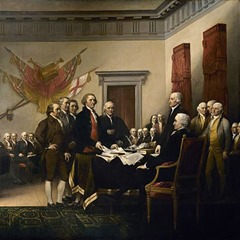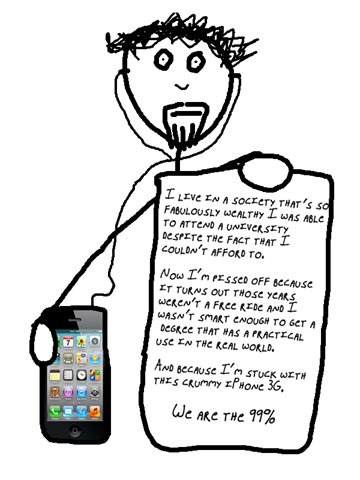You are currently browsing the tag archive for the ‘Politics’ tag.
The current background music in our house is the soundtrack to Hamilton: An American Musical. This is a good thing, as my wife adores it, I like it more every day, and my son’s understanding of US history is positively impacted. As a parent, as an American and as a thinking person, I want my son to know what the Founding Drunkards were really like. I don’t want him to grow up believing the same lies I was taught when I was his age. For good reason.
Here’s the deal – the Founding Drunkards were human. Flawed, annoying, ridiculous humans. Just like the rest of us. Most everyone who has a knowledge of US history beyond the grade school level is aware of this.
When we are young and our society thinks our young minds need to be instilled with a certain amount of patriotism (often confused with nationalism), we are taught that the Founders are larger-than-life figures, noble in purpose and pure of heart. The idea is to get us to love our country and the Founders are presented as the personification(s) of everything that is good and beautiful and decent about the United States of America.
As we get older, most of us (especially the historians among us) get a fuller, more accurate picture of the Drunkards. We learn a thing or two about their flaws. We discover – despite ourselves – that they were human, and therefore necessarily flawed. And if we really pay attention, we notice that most of them were deeply flawed.
Case in point: slavery. I’m sure most of you know that many of the Founding Drunkards were slave owners (with notable exceptions – Hamilton, for instance, was a dedicated abolitionist). I’m sure you’re also aware of the usual narratives offered to explain why it’s somehow magically okay that they were slave owners. We are told, for instance, that Washington inherited slaves (as though this made it acceptable). And this is partially true. When he was eleven years old, Washington inherited ten slaves. At the time of his death, however, there were a total of 318 slaves residing at Mount Vernon.
Washington was by no means unique in this. Jefferson’s relations with his slaves are well known. The point is that the bulk of them weren’t exactly against slavery.
I am not judging these men here. I am merely trying to underscore a point. You see, all of the Founding Drunkards knew – they knew – that slavery was morally wrong. Yet for many of them their economic standing depended upon slavery. They were rich and powerful men and their wealth and their power depended upon slavery. Which leads to my point, which is important enough to merit large boldface letters:
When faced with a choice between their morals or their wealth and power, they did NOT choose their morals.
Does this make them bad people? Maybe. I don’t know, and that’s not what I’m talking about here.
What I’m talking about is the basic design spec of the United States of America. This country was designed by a bunch of guys who cared more about their own wealth and power than about other people’s basic human rights. Hell – they ranked their own wealth and power above their own morals. Their priorities and motives are evident.
And these are the guys who designed our government and our political system.
Think about that for a minute.
From the outset, the United States of America was designed by a bunch of rich white guys for the express purpose of preserving and advancing their own personal wealth and power. For this reason, they specifically designed it to be an amoral system. And this turned out to be both a bug and a feature.
It’s a feature because it made for the separation of church and state, an idea that worked pretty well until the 1950s when American politicians started trying to inject their own personal God into our lives. We’ve been striving against this ever since – and have been largely successful – but the struggle continues. As you probably already know.
The amoral nature of our system is a bug in that there is absolutely no common decency built into it whatsoever. But it’s an easy bug to forgive because there’s no reasonable way to achieve the feature without also accepting the bug.
The problem with all of this is that most of us – deep down – don’t really understand it. We may know the details on an intellectual level, but underneath it all we really believe it’s something different. When we are children and are taught about the Founders as great and noble and admirable, we are instilled with an unreasonable – and unreasoning – faith in our political system.
And this gives us funny ideas about politics. We find ourselves believing in things rather than thinking about them. We forget that politics attracts wealthy, powerful, ambitious people. We believe that there really can be larger than life figures who – superhero-like – will arrive on the political scene and save us all.
I’m sorry to inform you that this just isn’t the case. It never has been, nor will it ever be. It just simply is not in the job spec. In fact, the nature of American politics actively repulses people who do not place their own ambition above morals and ethics.
This is not a problem if we simply look at the situation clearly. What we have right now in the United States of America is a job opening. Just that. I’m not drawing an analogy here – we really do have a job opening and it’s up to We The People to fill it. And if you’ve been part of the hiring process before you know that it’s always a bad idea to fill a job vacancy based only on how much you like a particular candidate.
I’m not telling you who to vote for. I assume that if you’ve read this far you probably have enough interest in the process to already be leaning toward a specific candidate. Chances are there’s somebody running whose message resonates with you and who is saying the kind of things you want to hear.
Which means they wrote a good cover letter. They figured out which things you – a prospective employer – want to hear, and they smartly said those things. This is an important part of the hiring process, but it’s just the beginning. Now it’s time to read the résumé.
Seriously. You wouldn’t hire someone based on their cover letter without also reading their résumé. So why would you elect someone based solely on their speeches without also considering their qualifications?
This should not be an emotional process, America, but a rational one.
 Those of you who know me know that I have my share of issues with this whole “Occupy (Insert name of Street or City Here)” movement. For the most part, my issues stem from a general lack of tolerance for hypocrisy. I don’t take Teabaggers seriously because they whine about taxes while at the same time complaining about potholes that aren’t getting filled. For much the same reasons I don’t have much use for people who wear designer jeans and drink Starbucks coffee while they Tweet on their iPhones about the evils of corporate America.
Those of you who know me know that I have my share of issues with this whole “Occupy (Insert name of Street or City Here)” movement. For the most part, my issues stem from a general lack of tolerance for hypocrisy. I don’t take Teabaggers seriously because they whine about taxes while at the same time complaining about potholes that aren’t getting filled. For much the same reasons I don’t have much use for people who wear designer jeans and drink Starbucks coffee while they Tweet on their iPhones about the evils of corporate America.
For the most part, though, my problems with OWS are not so much with the message as with the messengers. While the issues surrounding economic inequality in this country are real and important, I don’t feel the reluctance of the white middle class to repay their student loans ranks terribly high among them.
As time has gone by, though, I find myself less and less enamored of the message behind the protests. In fact, the entire movement has completely failed to impress me. This concerned me at first, mainly because I felt I should be impressed. Economic equality is just the sort of socialist idea I can really get behind, so on the surface it really appeared to be my kind of movement. But once I looked hard at the movement – looked below the surface – I realized it’s not actually my kind of movement at all.
Why? Because it’s got no soul. It’s got no heart. It is a movement that is incapable of seeing beyond itself. Or maybe it’s just unwilling to. It has been called an inherently selfish movement by many (myself included), although it may be more fair to call it ‘self centered’ or ‘self-absorbed’.
I’ve heard the arguments – that we should endeavor to look beyond the iPhones and the designer jeans to the message beneath. That the ‘message’ of OWS is in their words, not their behaviors (any 4-year-old can tell you differently). Here’s a news flash: the message is getting out to the world, and it is loud and clear. But it isn’t necessarily the message OWS thinks it’s broadcasting. If you bring a gun to an anti-war protest, your message is not one of peace, no matter what you say.
I have repeatedly seen attempts to compare OWS to the civil rights movement, as well as to the anti-war counterculture movements of the 1960s. All of these attempts have failed, and in their failure they underscore the fundamental shortcomings of OWS. Its lack of a soul. Its absence of heart.
First off, lets dismiss any comparisons to the civil rights movement. I’m sorry, but placing OWS into the same category with Freedom Rides is almost insulting. Let’s face facts here, people – those actively participating in the major events of the American civil rights movement were risking a great deal more than a dose of pepper spray. And while a faceful of pepper spray is not exactly a pleasant experience, in comparison to the civil rights movement participating in OWS is practically risk free. They also were fighting for rights on a far different level than those claimed by OWS. They weren’t looking for a bigger slice of the pie – they just wanted to be allowed into the restaurant. Those occupying Wall Street may argue differently, but in the eyes of the law, the 99% have the same rights as the 1% (in theory, at least). This was not the case for African Americans well into the twentieth century. Today, no African American can legally be stopped from drinking out of a public water fountain. The importance of this statement cannot be understood by anyone who would compare OWS to the civil rights movement.
When the proponents of OWS compare it to the anti-war counterculture movements of the 1960s, they are on slightly less shaky ground. But only slightly. The movements of the 1960s – like OWS – were primarily white middle-class movements. And this is pretty much where the comparisons end. When we start looking for more similarities is when the self-absorption of OWS stands out.
In both cases, we’re talking about the (primarily white) middle class. We’re talking about people who have every door open to them. Who have every opportunity available to them. Who have every right and privilege handed to them. From this starting point, vastly different messages arose.
OWS looks to the gap between itself and the 1% and says to the world: “This inequality is inexcusable. We should not have to settle for what we have when these few have so much. As a society, we should take steps to reduce what they have so that the rest of us can have more.”
In contrast, those protesting in the 1960s looked to the gap between themselves and those who had less and said to the world: “This inequality is inexcusable. We should not allow members of our society to have so little when we have so much. As a society, we should take steps to increase what they have, even if it means decreasing what we have.”
The movements of the 1960s were selfless (this is not to say that there were no egos involved). They were about ending war. They were about treating each other fairly. They were about striving toward equality by giving – not by taking.
Those on the ground in the 1960s also saw inherent flaws in American consumer culture. They too saw rampant consumption and pervasive greed, and they feared the results of them. Their response to it, though, was almost opposite to OWSers – they opted out. When they saw a culture of avarice that they felt had eroded their society and threatened their world, their response was to turn their backs on it – not to demand more of it. Thus the term ‘counterculture’.
If OWS had occurred in the 1960s, iPhones wouldn’t have been used to Tweet about it. They would have been used as firewood.
The counterculture movements of the 1960s possessed something that OWS sadly lacks. They had heart, soul and yes – even magic. Because of this, they gave birth to greatness. Heroes don’t give birth to movements – movements give birth to heroes. The 1960s produced the likes of Abbie Hoffman and the rest of the Chicago Seven. (The civil rights movement produced even bigger giants.)
This is the soul that OWS lacks. And without it I feel it is doomed to failure. Where is its Hoffman, its Dylan, its Joplin, its Baez?
Speaking of which, where in hell is the music? How is it that this movement has inspired so little? Oh – I know that the people on the ground have been attempting to write songs. I’ve listened to some of them. And that’s all I’m going to say about that.
And I was going to continue my decades-old practice of ignoring Third Eye Blind, but I will go so far as to give them 10 bonus points for offering their song as a free download. And then I’ll take 5 of those points away because one of the places they posted it is their Facebook page. However, you’re fooling yourself if you see their “anthem” as anything other than a thinly-veiled attempt to resuscitate their dead careers.
The 1960s, though, produced music of a different sort. The kind of music that never goes out of style. The kind of music that understands that peace is the answer to war, love is the answer to hatred, and generosity is the answer to greed. The kind of music that shines light into dark places and makes flowers grow there.
The kind of music that can somehow magically transform half a million sweaty, mud-caked, tripping hippies into Stardust.




